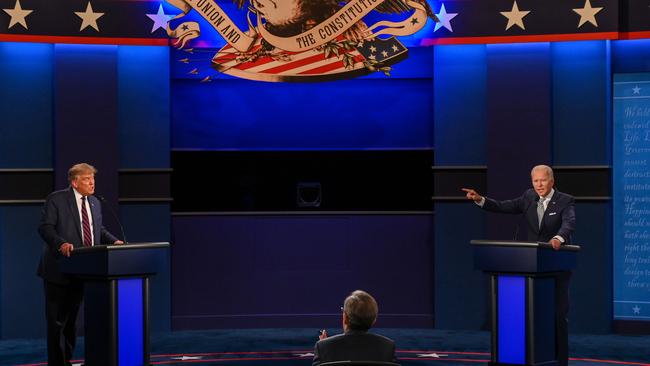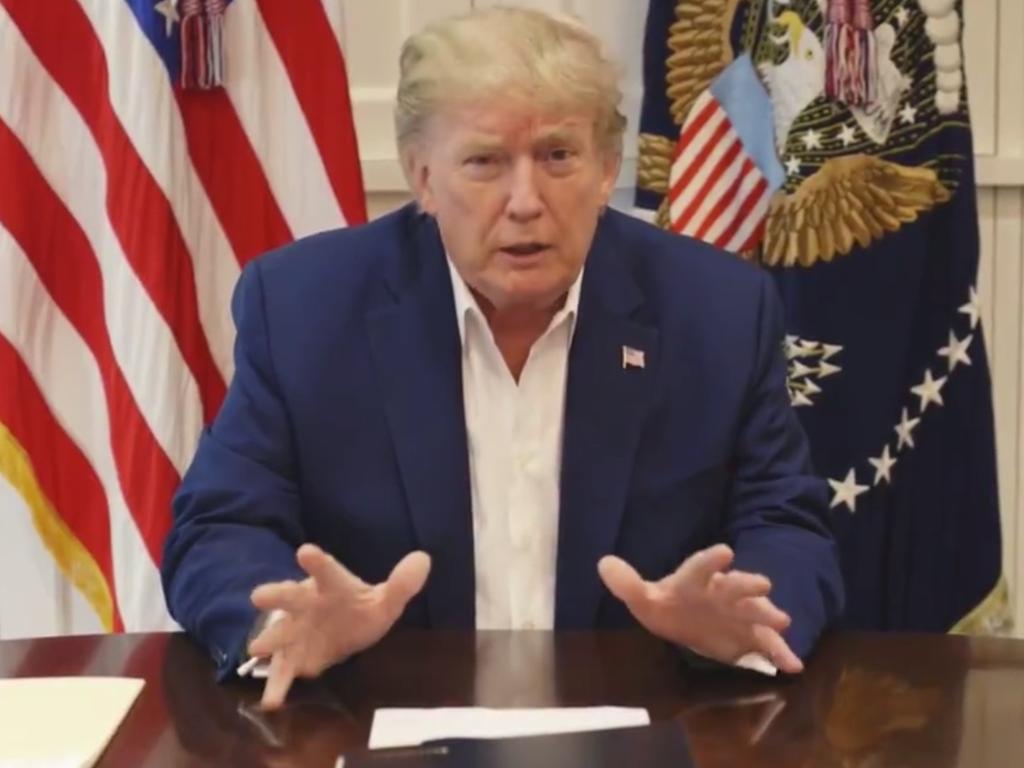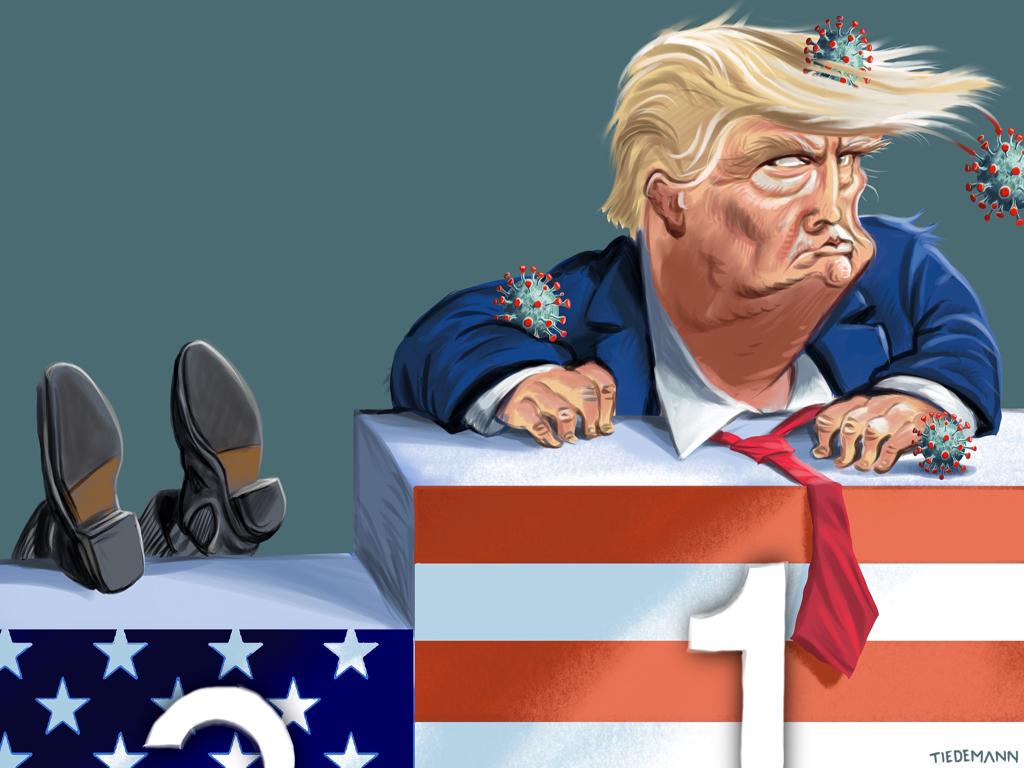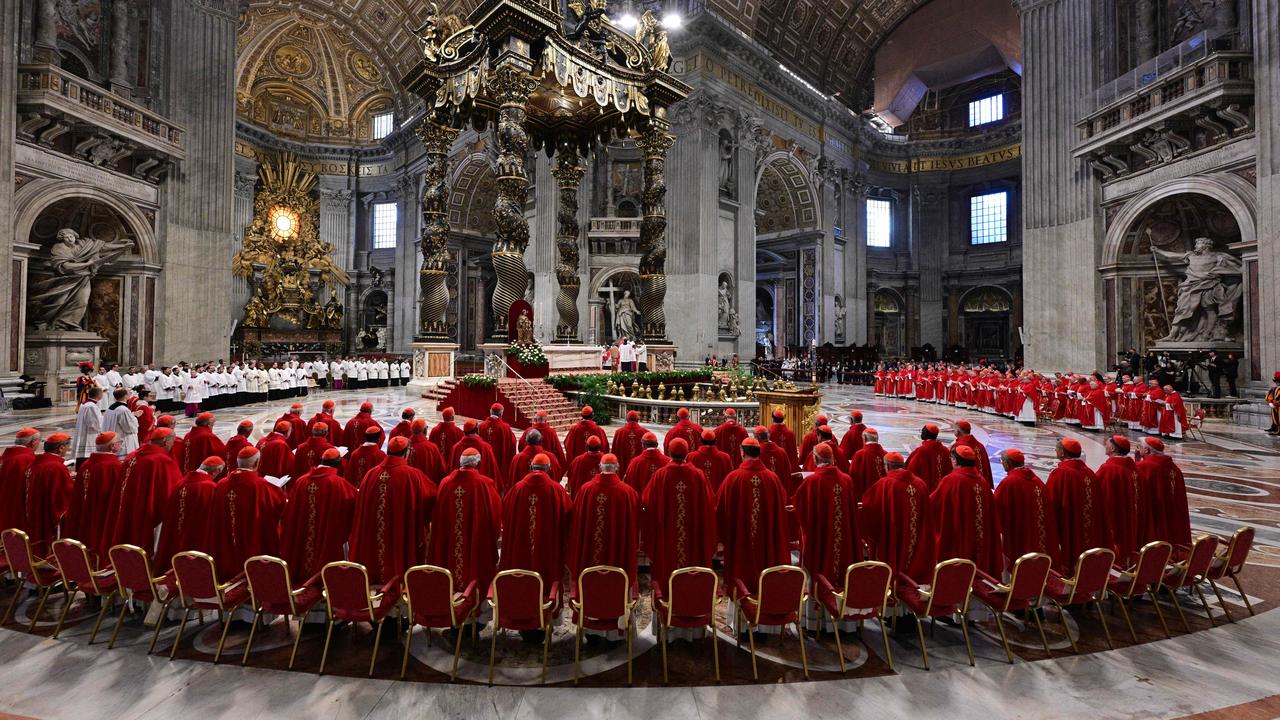Covid sends Donald Trump and campaign to hospital but recovery still just possible
The President is a fighter … and just maybe the virus will swing things his way.

Trump may be paranoid; he certainly has plenty of enemies, chief among them this microscopically tiny COVID-19 virus that has dismantled all the achievements of his presidency — particularly the pre-virus economy — and has now physically attacked the President and his wife. Talk about an October surprise!
It was heartening to see public figures across the ideological divide wish Donald and Melania Trump a speedy recovery. We are all human beings, after all, and humanity transcends politics. Love Trump or loathe him, no one wishes this virus on him or his family.
But this infection has devastating political consequences. If Joe Biden does become president, his victory will owe a mighty debt to the coronavirus.
There are immediate practical questions. Trump is pretty robust, but people said that of British Prime Minister Boris Johnson, who nearly died from COVID-19. Trump is 74 years old and seriously overweight, two of the strongest predictors of COVID-19 trouble.
His close aide, Hope Hicks, who first tested positive with the virus, is 31, healthy and not overweight. She is very unwell.
Trump plans to continue performing the duties of President during his 14 days of quarantine. This may not be practical and it may worsen his condition. Carrying on while infected contributed to Johnson’s troubles. The British PM had mild symptoms to start, then things worsened suddenly and he ended up in intensive care. The are consistent reports that Johnson has not been the same since, even after a long recovery.
Trump has no guarantee from the virus that he will be fit and well again in 14 days. If he becomes seriously unwell, he may have to transfer power, temporarily, to Vice-President Mike Pence.
Trump would hate that. More than anything, Trump has striven all through his presidency, indeed throughout his candidacy in 2016 and to some extent through his whole life, to communicate dominance, mastery of any situation.
The next presidential debate is scheduled in two weeks time. Assuming Trump remains well, this would still be an extremely awkward encounter. It would probably be forgiven as reasonable if the Biden camp suggested that the debate take place remotely, via Zoom.
This infection could not possibly have come at a worse time for Trump. It has two immediate strategic consequences.

First, for at least the next 14 days, Trump cannot campaign physically around the country. This is Trump’s lifeblood as a politician. He draws huge energy from speaking to rallies and dealing with big crowds. He loves being on stage. These rallies are his most effective moments of communication. They motivate his voters. They exude energy. They inspire his supporters. And no matter how much a TV network or radio station may dislike Trump, they are forced to cover these events.
The attention any president gets when he visits any US location is one of the structural advantages enjoyed by incumbents. All that is gone. Biden will follow his gentle dance card of carefully distanced and low-energy appearances — and, by an astonishing irony, may now look the more energetic candidate.
Second, COVID-19 again becomes the central issue of the election. Opinion polls have their limitations, but they clearly show most Americans regard Trump more highly on the economy than they do Biden, while the situation is powerfully reversed when it comes to the management of COVID-19.
Trump has tried to change the campaign subject away from COVID-19 — but now the virus is the subject on everyone’s lips once more.
Trump’s own illness seems to contradict the thrust of his message on COVID-19 — that the virus has been overplayed, that it’s not necessary to wear masks, that the importance of social distancing has been exaggerated, that it’s OK to have endless indoor meetings at the White House without either masks or effective social distancing rules in place.
Trump got the virus the same day as 43,000 other Americans. The most powerful moment at the recent Democratic national convention, which was generally a lame and ineffective affair, was when a young woman recounted the story that her father was a Trump supporter and took the President’s advice not to take the virus too seriously. He went out and had drinks with friends, caught the virus and died. She blamed Trump for her father’s death. This may have been unfair but even Trump’s closest supporters would acknowledge that his advice to the public has been erratic, inconsistent and at time irresponsible, with a strange, lingering ambivalence about masks in particular. At times he has contradicted his experts. At times he has contradicted himself.
His freewheeling verbal style has some real strengths. It is particularly good at a task like talking up the US economy or lampooning an opponent. It is poorly suited to giving precise health advice and communicating reassurance, stability and calm.
For all that, Trump is still not to be written off. His campaign is running out of time. I thought he may have made some headway in the first debate in seeding doubts about Biden on law and order and the economy. But the polls still put Trump well behind.
Then again, the polls put Trump well behind Hillary Clinton in 2016 as well, and he won the presidency. But the past does not guarantee the future.
The polls have been moving around a little bit but they have not moved substantially in Trump’s favour. The latest RealClearPolitics average of the national polls gives Biden a 7 per cent lead over Trump. This lead has been remarkably stable at 6 or 7 per cent for a long time.
Nate Silver of the 538 website dedicated to analysing election chances puts the lead for Biden slightly higher than that. Its election forecaster predicts Trump as having a 21 per cent chance of winning, which is small but by no means negligible.
The Economist magazine runs a data analysis program which at this stage gives Trump a 10 per cent chance of winning.
Here are the two big cautions. Last time, Trump lost the popular vote by nearly three million, or 2 per cent, and yet won a majority in the Electoral College. And last time the polls in the battleground states were sufficiently inaccurate as to not predict the slew of mid-Western states Trump won to secure the presidency.
Pollsters claim they have learnt the lessons of that experience. They interview more non-college educated white voters, for example. But the culture wars have become much more vicious in the past four years. A slew of recent polls across the Anglo world seem to indicate a near structural understatement of conservative voters. They may really be “shy conservatives” who don’t like to declare their intentions to pollsters. Polls underestimated the Conservative vote in David Cameron’s win in Britain in 2015. Last year in Britain, the polls said the race was close but Johnson won a huge majority.
The polls got the Brexit referendum wrong in 2016. And in our own most recent election, the polls forecast a Bill Shorten government. Instead, Scott Morrison increased the Coalition’s vote.
But the two most unsentimental forecasters — the stockmarket and the betting markets — have moved against Trump. The betting odds have got considerably longer against Trump in the past week. The stockmarket plunged after the debate because a Biden victory seemed more likely.
That not only tells you companies think Biden will win. It also reveals they think a Biden administration would be much worse for the US economy than a re-elected Trump. Trump is pro-business, pro-deregulation, pro-energy independence via fracking and new exploration, low tax and vigorous about gaining trade advantages for the US and repatriating manufacturing. Biden is promising higher taxes, radical green measures, new spending as far as the eye can see and will be dominated by a Democratic Party now further to the left than at any time since World War II. Business has its problems with the erratic nature of the Trump administration, but it certainly knows which of the two candidates is likely to be better for the economy.
There are some contrary indicators that are potentially promising for Trump. Republicans have been more active in registering new voters in person, whereas Democrats have tried to do it remotely. The contest is very close in Florida, and The Economist argues that if Trump wins Florida he will have a nearly 50 per cent chance of winning the Electoral College, and the White House.

RealClearPolitics, though it has Biden ahead nationally by a bigger margin than Clinton was at this point four years ago, actually has Trump in the battleground states marginally closer to Biden than he was to Clinton.
The biggest contrast to 2016 is that Trump lacks the compelling rationale for his candidacy that he had then. Some things he says are dishonest, foolish or just weird. But some are true, and no one else will say them. In 2016, he campaigned on some real issues. He wanted to end illegal immigration, in part by building a wall between the US and Mexico. He wanted to cut taxes. He wanted to change trade agreements so US interests were better protected. He wanted to change US trading arrangements with China. He campaigned against two aspects of Obamacare — that it would damage or snuff out some private health insurance arrangements, and that it would increase the cost of premiums. And he campaigned against the ethos and style of Washington insiders (“drain the swamp”), as particularly exemplified by Bill and Hillary Clinton.
In other words, he had four or five key messages — and four or five key proposals — that Americans could understand, and about half the nation agreed with.
In the debate against Biden, Trump had too many messages, too many data points. It’s a syndrome that afflicts many an incumbent president seeking re-election. There were too many things he wanted to tell the audience, so, although he rained down some significant blows on Biden, he was all over the shop, with many arguments alluded to rather than coherently elucidated.
The great simplifier was caught up in too many complexities. If the coronavirus slows him down to merely warp speed, it could even, just possibly, make Trump more effective as a political communicator.
Wouldn’t that be the most astonishing turn-up of all in this most astonishing presidency.








Donald Trump in 2016 was the luckiest presidential candidate in history. In 2020, he is surely the unluckiest president ever to stage a re-election campaign.